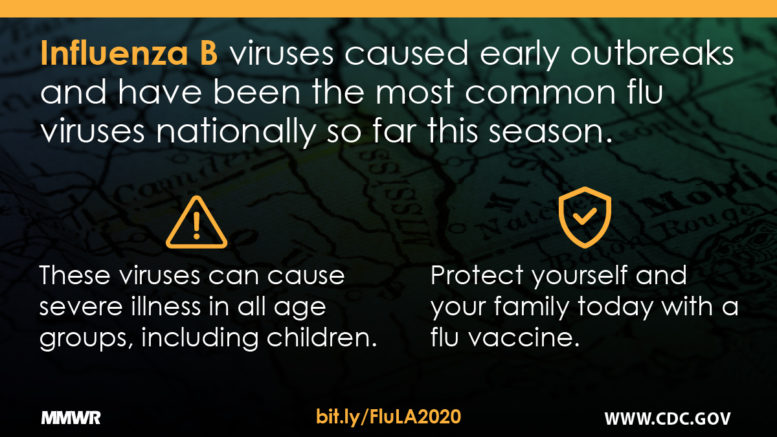Owusu, et al. (2019) are reporting in the Jan. 10, 2020 Morbidity and Mortality Weekly Report that multiple genetically distinct influenza B/Victoria lineage viruses have cocirculated in the United States recently, circulating sporadically during the 2018–19 season and more frequently early during the 2019–20 season.
They observe, "The beginning of the 2019–20 influenza season in Louisiana was unusually early and intense, with infections primarily caused by influenza B/Victoria lineage viruses. One large pediatric healthcare facility in New Orleans (facility A) reported 1,268 laboratory-confirmed influenza B virus infections, including 23 hospitalizations from July 31 to November 21, 2019, a time when influenza activity is typically low. During this period, Louisiana also reported one pediatric death associated with influenza B virus infection. An investigation of the influenza B virus infections in Louisiana, including medical and vaccine record abstraction on 198 patients, primarily from facility A, with sporadic cases from other facilities in the state, found that none of the patients had received 2019–20 seasonal influenza vaccine, in part because influenza activity began before influenza vaccination typically occurs. Among 83 influenza B viruses sequenced from 198 patients in Louisiana, 81 (98%) belonged to the recently emerged B/Victoria V1A.3 genetic subclade."
Nationally, to date, the researchers add, B/Victoria viruses are the most commonly reported influenza viruses among persons younger than 25 years. Of the 198 patients in the investigation, 95% were aged <18 years. Although most illnesses were uncomplicated, the number of hospitalizations, clinical complications, and the reported pediatric death in Louisiana serve as a reminder that, even though influenza B viruses are less common than influenza A viruses in most seasons, influenza B virus infection can be severe in children. All persons aged ≥6 months should receive an annual influenza vaccination if they have not already received it. Antiviral treatment of influenza is recommended as soon as possible for all hospitalized patients and for outpatients at high risk for influenza complications (including children aged <2 years and persons with underlying medical conditions).
Reference: Owusu D, Hand J, et al. U.S. Department of Health and Human Services Centers for Disease Control and Prevention. Early Season Pediatric Influenza B/Victoria Virus Infections Associated with a Recently Emerged Virus Subclade — Louisiana, 2019. Morbidity and Mortality Weekly Report. Vol. 69. Jan. 10, 2020.

Be the first to comment on "Researchers Report on Recently Emerged Influenza Virus Subclade"